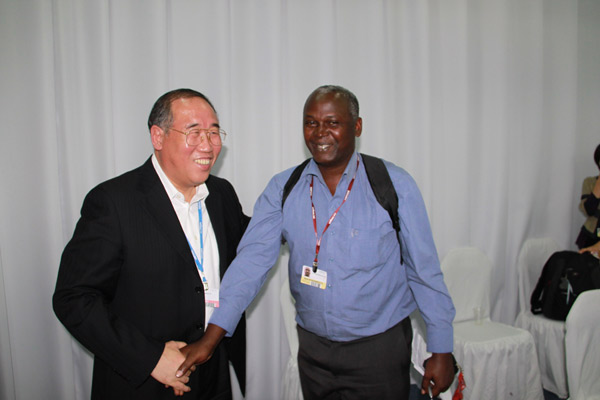News Flash
Continuing Kyoto is 'key issue'
By Li Xing, Li Jing and Lan Lan (China Daily)
Updated: 2010-12-11 09:46
 |
Large Medium Small |
CANCUN, Mexico - Confirmation of the second commitment period of the Kyoto Protocol is the focal issue of the Cancun talks, Xie Zhenhua, head of the Chinese delegation, said in his meeting with representatives of international non-government organizations on the sideline of the United Nations Climate Change Conference in Cancun on Thursday.
|
 Xie Zhenhua shakes hands with Geoffrey Kamese, program officer of the National Association of Professional Environmentalists from Uganda. [Dong Wei / for China Daily] |
"For us, the key to measuring whether Cancun can successfully move the climate talks forward is the continuation of the Kyoto Protocol," he said.
He repeated China's position by saying the country will "defend" and "stand firm" on the protocol.
The Kyoto Protocol is the result of some 20 years' efforts of all countries, he said. It has played an important role in global actions to reduce greenhouse gas emissions.
Some countries have raised the issue that the total global emission reductions under the protocol are inadequate.
Xie said the way to address the issue is to ensure that developed countries not a party to the protocol make their targets to reduce greenhouse gas emissions comparable with those made under the protocol.
Developing countries can make voluntary efforts for appropriate mitigation efforts under the United Nations Framework Convention on Climate Change framework.
The Bali Action Plan made all those arrangements. "The question is how to implement these arrangements, so we can see which countries are implementing and which are not implementing their commitments," Xie said.
On the transparency issue, which has attracted much attention, Xie said China has shown its flexibility.
"We agree with international consultation and analysis (ICA). We agree that we need to have regulations on targets, and the ICA principles on voluntary actions using domestic resources, but details need to be worked out," Xie said.
But the principles should be non-invasive, non-punitive, respect national sovereignty and be based on mutual trust, and improve understanding, he said.
Sanjay Vashist, director of the Climate Action Network International, South Asia, asked if China and other countries should achieve higher emission reduction goals as people in small island and least developed countries are suffering from adverse impact of climate change.
Xie said that China, as a developing country, also suffers greatly from climate change. Every year, more than 2,000 lives and some 200 billion yuan ($30 billion) are lost due to extreme weather.
He said he has visited Ethiopia and the small Caribbean island of Grenada and saw with his own eyes how African and small island countries are severely impacted.
"I arrived in Grenada just after hurricanes attacked the island country," he said, adding he saw the devastation and was struck by the fact that some factories lost 90 percent of their production capacity in just one night.
On Thursday, Xie told Mexican television that "the Chinese delegation has a very positive and strong will for an outcome from the Cancun meeting and progress must be made".
Xie called on all delegations to "strive a balance between principle and flexibility", but the fundamental principle must be confirmed.



